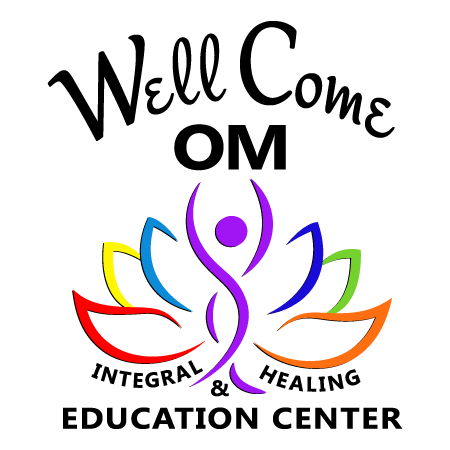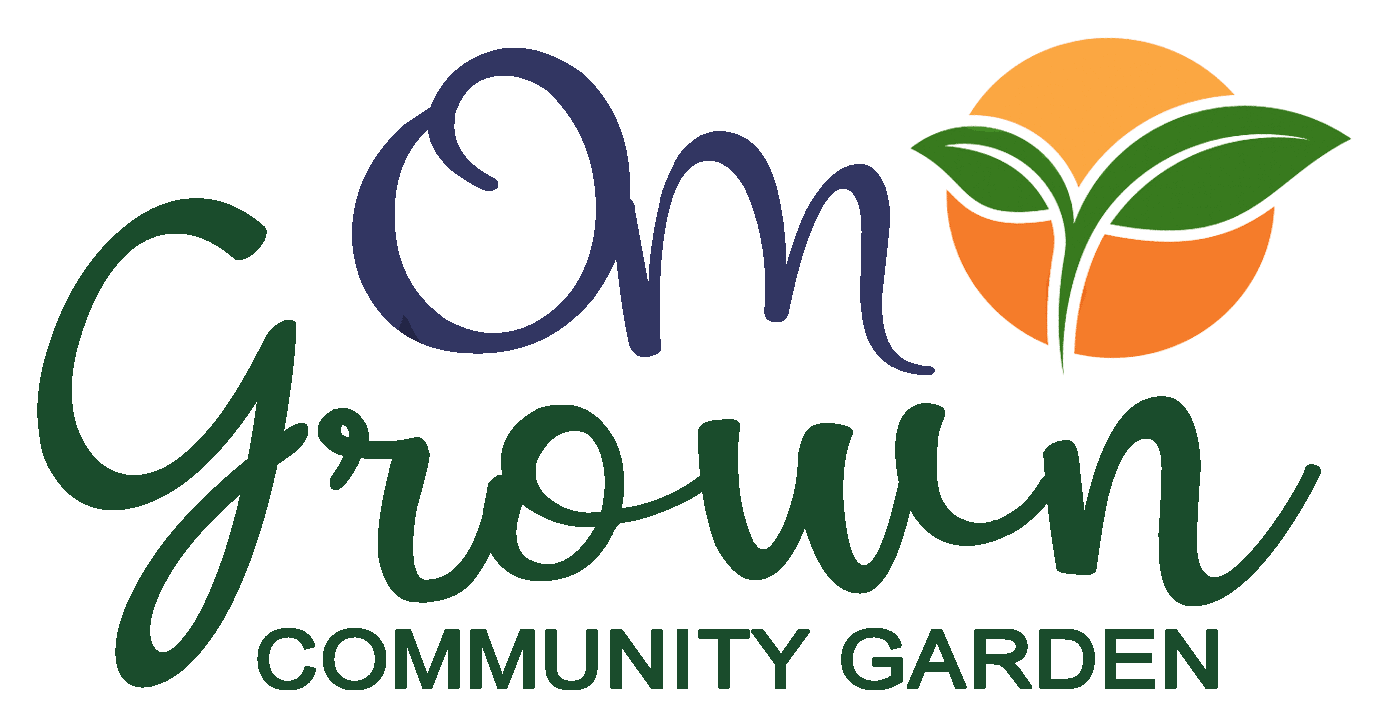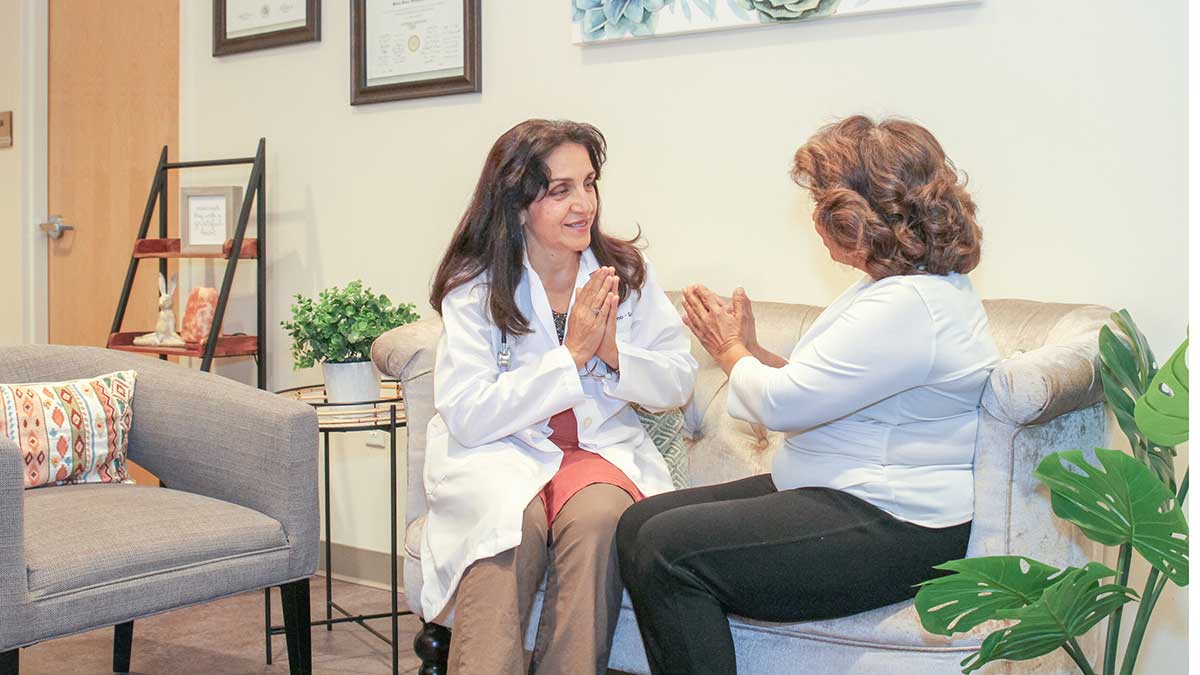In an increasingly complex and interconnected world, our approach to health and wellness is also evolving. We have become more aware of the limitations of the disease-centered model of modern conventional medicine and are embracing a more holistic, patient-centered approach.
This comprehensive guide explores the fundamental shift towards Integrative and Lifestyle Medicine, which considers the whole person and emphasizes the importance of the practitioner-patient relationship. It dives into various alternative and complementary medicinal approaches, provides insights into tackling common diseases with lifestyle modifications, and sheds light on some highly effective health interventions.
As we traverse this landscape, we will also introduce you to the transformative world of Integrative Healing at OM, where authentic healing takes center stage. Prepare to embark on a journey toward comprehensive health and wellness.
Table of Contents
Why Lifestyle Medicine?
As we stand at the crossroads of healthcare evolution, Lifestyle Medicine emerges as a powerful beacon, guiding us toward a more comprehensive and personalized approach to health. To fully understand this burgeoning field, let’s start by defining some key terms:
- Alternative Medicine: These are non-conventional methods employed instead of Western modern medicine.
- Complementary Medicine: This refers to the integration of both conventional and alternative methods.
- Holistic Care: A comprehensive approach that acknowledges the interplay of the mind, body, and spirit in our overall well-being.
Lifestyle Medicine represents a paradigm shift from a primarily pharmaceutical-based approach to a more proactive and holistic model. Its focus extends beyond mere disease management to embrace prevention and sustainable health improvement through lifestyle modifications. This doesn’t negate the importance of medication. Instead, it underscores the fact that lifestyle interventions should ideally be our first line of defense against disease, with medication serving as a supportive measure when needed.
Integrative Medicine brings together conventional medicine, lifestyle interventions, and elements of functional and naturopathic medicine.
The rise of Lifestyle Medicine aligns with a notable change in public sentiment. Today, approximately 40% of the U.S. population uses some form of alternative or complementary care, a statistic that reflects a growing wariness of conventional medical doctrine and an increased interest in holistic health solutions.
For physicians, Lifestyle Medicine offers a broader toolkit, supplementing traditional treatment options with an array of non-pharmaceutical methods. This approach doesn’t aim to replace conventional medicine. Instead, it seeks to enrich it, enabling a more personalized, effective, and sustainable approach to patient care.
Perhaps the most significant appeal of Lifestyle Medicine lies in its holistic ethos. It recognizes that true health is not merely the absence of disease but a state of complete physical, mental, and social well-being. It encourages individuals to take control of their health, fostering an active, involved approach to personal wellness. Through the lens of Lifestyle Medicine, the journey toward health isn’t a destination but a continuous process of growth and improvement. The goal is not just to treat diseases but to promote healthier, more fulfilling lifestyles. With Lifestyle Medicine, wellness is indeed the way forward!
How is Lifestyle Medicine Defined?
Lifestyle Medicine is an emerging specialty that focuses on the use of evidence-based lifestyle therapeutic interventions. Clinicians trained and certified in this discipline use these modalities as their primary means to prevent, treat, and often even reverse chronic disease.
Lifestyle Medicine is unique in its approach. It doesn’t just treat symptoms of disease but rather addresses the root causes, most of which are linked to our lifestyle choices. It is this understanding that makes Lifestyle Medicine such an essential tool in our fight against the modern epidemic of chronic diseases.
Let’s delve into the key components that define Lifestyle Medicine:
- A Whole Food Plant-Based Eating Pattern: This is a diet rich in fruits, vegetables, whole grains, and legumes. It emphasizes the consumption of nutrient-dense, unprocessed foods while minimizing animal products and processed foods.
- Regular Physical Activity: Exercise is a cornerstone of Lifestyle Medicine. Regular physical activity helps reduce the risk of chronic diseases and improve physical and mental health.
- Restorative Sleep: Good quality sleep is crucial for overall health. Lifestyle Medicine recognizes the importance of restorative sleep and incorporates strategies to improve sleep hygiene.
- Stress Management: Chronic stress negatively impacts health. As part of a Lifestyle Medicine approach, stress management techniques such as mindfulness, yoga, and meditation are employed to promote mental health and resilience.
- Avoidance of Risky Substances: This includes abstaining from smoking, limiting alcohol intake, and avoiding recreational drugs and other harmful substances.
- Positive Social Connections: Healthy relationships and a strong social support system are vital for mental and physical health. Lifestyle Medicine promotes positive social interactions as a part of overall health and wellness.
These six pillars form the foundation of Lifestyle Medicine. They work synergistically to support overall health and wellness, as well as prevent, manage, and even reverse chronic diseases. By addressing these lifestyle factors, Lifestyle Medicine provides a comprehensive approach to health that empowers individuals to take charge of their well-being.
Alternative/ Complementary Medicinal Approaches
As we delve deeper into the realm of healthcare, a spectrum of alternative and complementary medicinal approaches emerges, offering a multitude of strategies to promote health and wellness. These methods, while distinct, often share a common focus on prevention, holistic treatment, and the innate healing power of the body.
Naturopathy
Coined by holistic Doctor John Scheel in 1895 and later popularized in the USA by Benedict Lust, Naturopathy combines a variety of natural and alternative methods. These include diet, herbs, exercise, massage, detoxification practices, homeopathy, and psychological counseling. Starting with licensure in just five states in 1958, Naturopathy has grown significantly over the decades, with 27 states now offering licensure for naturopaths. In countries like Switzerland, over a third of the population uses Naturopathy as their primary care approach.
Homeopathy
With its founding principle of “like cures like,” Homeopathy uses heavily diluted agents to treat symptoms similar to those they would cause at higher doses. Originating in Germany in the late 1700s, it’s now widely used in various parts of Europe and is gaining recognition in the U.S.
Functional Medicine
Functional Medicine, as per the Institute for Functional Medicine (IFM), trains practitioners to identify the root causes of disease, considering factors from preconception to present. This approach takes into account family history, lifestyle, and early life experiences. Detoxification is often a significant focus in Functional Medicine.
Macrobiotics
Macrobiotics emphasizes balance and harmony through organic, vegetable-based foods, simplicity, and avoidance of chemicals and drugs. This traditional lifestyle approach has demonstrated exceptional outcomes.
Traditional Chinese Medicine
This approach seeks the balance and harmony of “chi” or life flow through methods such as herbs, acupuncture, qi gong, and massage.
Ayurveda
A 5,000-year-old form of healing originating in India, Ayurveda focuses on the balance and harmony of “prana” or life flow.
Chiropractics
An ancient technique revived in the 19th century, Chiropractics employs spinal adjustments to alleviate pain and restore joint and muscle function. This practice enjoys full licensure across all U.S. states.
Acupuncture
A 4,000-year-old practice introduced to the U.S. in 1971, Acupuncture has shown promise in treating conditions such as migraines, osteoarthritis of the knees, neck and back pain, fibromyalgia, post-operative pain, and chemotherapy-induced nausea.
Sound Healing
Based on the principle that certain frequencies resonate with the body’s own electromagnetics, Sound Healing aims to reset or clear energy fields, addressing body imbalances. This practice dates back to ancient times.
Energy Medicine
This hands-on approach involves the movement of “chi” or “prana” and represents another ancient form of healing.
Integrative Medicine
Integrative Medicine melds conventional methods with one or more alternative or complementary approaches, providing a comprehensive strategy for health and wellness.
Each of these approaches offers unique perspectives and tools for health management, underscoring the vast possibilities available beyond conventional medicine. While their methods may vary, their shared focus on prevention, holistic treatment, and the body’s innate healing capacity reflects the core principles of Lifestyle Medicine.
Modern Conventional Medicine
Modern conventional medicine, often referred to as Western medicine, plays a vital role in today’s healthcare landscape. However, it primarily operates under a disease-oriented model. This model focuses on diagnosing and treating diseases, typically through pharmaceuticals and surgical interventions.
While these methods have brought about significant advancements in healthcare, prolonging lives and eradicating numerous diseases, they often focus primarily on managing symptoms rather than addressing root causes. This approach has its limitations, especially when dealing with chronic conditions that require long-term management.
In a disease-oriented system, the patient’s unique circumstances, lifestyle, and personal health goals may sometimes be overlooked. The focus is primarily on the disease or the disorder itself – identifying it, classifying it, and treating it in isolation. While this method can be effective for acute illnesses or conditions that require immediate intervention, it may fall short in managing chronic diseases that are often influenced by lifestyle factors.
For instance, diseases like type 2 diabetes, heart disease, and certain types of cancer have complex etiologies tied to lifestyle choices, environmental factors, and genetics. Treating these diseases purely with medication addresses the symptoms but not the underlying lifestyle factors contributing to the disease’s development and progression.
Furthermore, the disease-oriented model often compartmentalizes health into separate systems, with specialists for each area. While this specialization has its advantages, it can lead to a fragmented understanding of a patient’s overall health.
In contrast, a patient-centered approach — as promoted by Lifestyle Medicine and complementary medicinal approaches — considers the whole person. It takes into account the physical, mental, and social factors affecting health. In this model, healthcare is not just about treating disease but about promoting overall wellness. It focuses on prevention, early intervention, and addressing the root causes of disease, aligning treatment with the patient’s unique circumstances and health goals.
While modern conventional medicine has made significant strides in managing and curing many diseases, there is a growing recognition of the need for a more holistic, patient-centered approach. This is where Lifestyle Medicine and complementary medicinal approaches can play an essential role, complementing the strengths of conventional medicine with a broader perspective on health and wellness.
Lifestyle Medicine is unique in its approach. It doesn’t just treat symptoms of disease but rather addresses the root causes, most of which are linked to our lifestyle choices.
Integrative Medicine
Integrative Medicine is an inclusive approach to health care that seeks to combine the best of different medical practices for a more holistic, patient-centered experience. It brings together conventional medicine, lifestyle interventions, and elements of functional and naturopathic medicine. This approach may or may not include the use of pharmaceuticals.
Here are the main characteristics of Integrative Medicine:
Patient-Centered Care
A cornerstone of Integrative Medicine is its focus on the individual. Practitioners engage with patients, take the time to listen carefully, and tailor treatments to the individual’s unique needs and goals.
Promotion of Health
Integrative Medicine promotes health as a positive, energetic flow of the life force. It’s not merely about the absence of disease but about achieving a state of complete physical, mental, and social well-being.
Holistic Approach
This approach considers the complex interplay of a person’s history, behaviors, diet, cooking techniques, stress levels, physical activity, exposure to chemicals, air quality, and relationships. It understands that all these elements interact to affect an individual’s health.
Focus on Prevention
Integrative Medicine emphasizes prevention through nutrition, botanicals, exercise, stress management, and social engagement. It recognizes that many chronic diseases are lifestyle-related and can be prevented or managed by adopting healthier habits.
Comprehensive Diagnostic Testing
Integrative Medicine uses comprehensive diagnostic testing that may include blood tests, stool analysis, hair and saliva tests, and heavy metal testing. These tools help to identify imbalances and potential health risks at an early stage.
Diverse Therapy Techniques
A wide range of therapy techniques are used in Integrative Medicine. These can include ozone therapy, hyperbaric oxygen therapy (HBOT), chelation, nutritional infusions, Reiki, Pure BioEnergy, Pulsed Electromagnetic Field (PEMF) therapy, Rife machines, Rolfing, the Feldenkrais Method, the Alexander Technique, yoga, tai chi, and meditation.
Evidence-Based Approach
Despite its broad and inclusive nature, Integrative Medicine is rooted in science. There are libraries of clinical trials from accredited sources that back up many of the practices used in Integrative Medicine.
Integrative Medicine represents an evolution in healthcare, one that brings together the strengths of different medicinal approaches for a more holistic, patient-centered, and preventive focus. It complements the advantages of modern conventional medicine with a broader perspective on health and wellness, echoing the principles of Lifestyle Medicine.
Approaching Common Diseases with Lifestyle Medicine
An integrative and lifestyle-based approach to medicine can play a significant role in managing common diseases and ailments. This approach is built on the understanding that lifestyle modifications can be powerful tools for preventing and managing various conditions. Let’s explore this approach with respect to common conditions like heart disease, hypertension, cancer, insulin resistance, diabetes, obesity, and insomnia.
Heart Disease
Studies like the Lifestyle Heart Trial, led by Dr. Dean Ornish, FACM, have demonstrated the potential of lifestyle medicine in managing heart disease. This trial found that a whole-food, plant-based, low-fat diet could reverse cardiac stenosis in one year, maintaining this reversal at a five-year follow-up. Similarly, the Esselstyn diet, free from animal products and oils, has been proven to regress coronary artery disease and atherosclerosis and reduce coronary events. A Mediterranean diet has also shown superiority over the standard Western diet in the secondary prevention of coronary artery disease.
Hypertension
The DASH (Dietary Approaches to Stop Hypertension) diet, which emphasizes plant-based foods, fish, poultry, beans, nuts, and a reduction in salt, sugar, fatty meats, dairy, and tropical oils, has proven to be effective in reducing high blood pressure. Other lifestyle interventions include increasing fiber intake, reducing salt to 1,500 mg, consuming foods higher in potassium, calcium, and magnesium, and practicing mindful meditation.
Cancer
Intensive nutrition and lifestyle changes can even alter our genes, as demonstrated by Dr. Dean Ornish and colleagues, who showed that these changes altered the expression of over 500 genes related to the tumorigenesis of prostate cancer. The risk of breast, colon, and prostate cancer increases with the consumption of red meat, processed meats, highly processed grains, added sugar, high saturated fats, and trans fats. A whole-food, plant-based dietary program, paired with healthy sleep for DNA repair and histone remodeling, can provide preventative measures against these types of cancers.
Insulin Resistance and Diabetes
The Nurses Health Study revealed that consuming processed meats more than five times per week was associated with a high risk for diabetes. It also identified that adipocytes, or fat cells, play a key role in the development of insulin resistance. As they increase in number and size, these fat cells disrupt insulin receptors, leading to insulin resistance. Fatty liver progression, also in the pancreas, is responsible for hepatic insulin resistance and beta cell dysfunction.
Obesity
The National Weight Control Registry (NWCR), the largest prospective study of successful weight loss, has found that many people need more than 150 minutes of moderate-intensity exercise weekly to maintain weight loss. Both physical activity and reduced caloric intake are needed to control body weight. A 2012 study showed that physical activity increased life expectancy at any activity level and across all BMI ranges.
Insomnia
Managing insomnia involves changes to both daytime and nighttime routines. Increasing early morning and afternoon sunlight, increasing outdoor physical activity, and reducing or eliminating nighttime caffeine, alcohol, and salty foods can be beneficial. Stress reduction with meditation, yoga, or calming activities like guided imagery can also aid sleep. Other strategies include making the bedroom dark and cool, avoiding cell phones and other electronic devices near the bed, and using hard wiring for computers and devices.
Lifestyle Medicine provides an integrative approach to common diseases that focuses on holistic health and wellness rather than simply treating symptoms. It emphasizes the role of diet, physical activity, and other lifestyle factors in disease prevention and management. This approach complements conventional medicine, creating a comprehensive care plan that truly puts the patient at the center.
Helpful Interventions for Improvement of Health
When it comes to improving health, making conscious choices related to food and lifestyle can have a transformative impact. Below are some interventions that can lead to a significant enhancement in your well-being.
- Whole-food, plant-based diet (WFPB): Plants contain over 100,000 phytochemicals that protect against major chronic illnesses. Animal foods, on the other hand, don’t provide this protective effect.
- Power foods: Incorporate herbs, turmeric, ginger, berries, avocados, onions, cruciferous vegetables, sprouted seeds, and flaxseeds into your diet regularly for their potent protective effects.
- Essential oils: Safe use of essential oils like frankincense, various mints, camphor, eucalyptus, and helichrysum have healing properties and are currently being studied for their potential benefits.
- Cooking methods: Opt for blanching, broiling, boiling, and sautéing rather than frying, baking, smoking, or grilling, which can increase harmful compounds like HCAs and AGEs. Avoid using microwaves as they can reduce nutrient density.
- Fermented foods: Consume fermented foods like miso, sauerkraut, kimchi, kombucha, pickled vegetables, and tempeh daily. These foods are natural sources of probiotics and aid digestion.
- Eliminate toxins: Avoid all artificial chemicals in foods, home, and personal care products. Limit the use of wireless devices and Wi-Fi due to potential harm from EMFs/RF.
- Plastic-free: Avoid plastic containers, bags, cups, and utensils. Opt for glass, stainless steel, or other eco-friendly materials instead.
- Clean water: Drink clean, non-fluoridated, filtered water to avoid potential toxins.
- Avoid alcohol: Alcohol can have a range of negative effects on your health and should be avoided or limited.
- Chew your food: Complete mastication aids in digestion, absorption, and elimination.
- Daily exercise: Engage in physical activity to the best of your ability daily.
- Sunlight and Vitamin D3: Get daily sunlight exposure and use Vitamin D3 supplements to maintain a serum level of 60-80 ng/ml.
- Supplements: A daily intake of a multimineral supplement, coenzyme Q10, nattokinase, quercetin, and iodine can improve overall health and prevent chronic illness.
- Deep breathing and meditation: Practice daily deep breathing exercises along with meditation. Cultivate gratitude and practice forgiveness for emotional well-being.
- Quality sleep: Ensure you get deep, restorative sleep every night.
By integrating these lifestyle interventions into your daily routine, you can significantly enhance your health and well-being, paving the way for a life of vitality and longevity.
Integrative Healing at OM
At Integrative Healing at OM, our primary goal is to transform the way healthcare is delivered. We don’t just treat symptoms. We look at you as a whole, recognizing that the mind, body, and spirit all contribute to overall health. To achieve this comprehensive care, we offer an array of services that go beyond traditional medicine. We provide Holistic Medical Care that takes into account every aspect of your well-being. Our Nutritional Counseling service is designed to help you make conscious, health-promoting dietary choices.
IV Vitamin Therapy can give your body the boost it needs to overcome illnesses and maintain optimal health. PureBioenergy(TM) Healing taps into your body’s energy fields to stimulate self-healing. Through Wellness Coaching, we guide you in adopting healthy lifestyle habits to prevent disease and sustain long-term health. And with HeartMath, we teach you how to harness the power of your heart-brain communication for improved stress management, emotional regulation, and overall wellness.
In our practice, each patient is valued as a unique individual. We take the time to listen to your concerns, understand your health history and goals, and work together to create a personalized plan that empowers you to take charge of your health. Welcome to Integrative Healing at OM, where your journey to authentic healing begins.
Led by the experienced Dr. Maria Scunziano-Singh, we seek to foster an environment where true healing begins. Our practice is nestled behind the bustling Publix/Target shopping plaza on US Hwy 19, in the inviting “Heal Building,” a cornerstone of the WellCome OM Integral Healing and Education Center in Spring Hill, Florida. Serving Hernando County and beyond, we embrace our mission statement: “Authentic Healing Starts Here.”
References & Recommended Reading
- Chanwoo, J. et al. (2023). The Opioid-Sparing Effect of Acupuncture After Abdominal Surgery: A Systemic Review and Meta Analysis Protocol. Journal of Pain Research, 16, 1095-1101.
- Esselstyn, C. et al. (2014). A Way to Reverse CAD? Journal of Family Practice, 63(7), 356-364.
- American Academy of Physicians. (2015). Family Physicians vs Naturopaths. Retrieved from AAFP.org.
- Gorski, D.H. (2014). Integrative Oncology: Really the Best of Both Worlds? Nature Reviews. Cancer, 14(10), 692-700.
- Irwin, M. et al. (2006). Comparative Meta-Analysis of Behavioral Interventions for Insomnia and Their Efficacy in Middle-Aged and Older Adults 55+ Years of Age. Health Psychology, 25(1), 3-14.
- Kelly, J. et al. (2021). Foundations of Lifestyle Medicine: Board Review Manual. American College of Lifestyle Medicine, 3rd ed, pp131-171.
- Kushi, M. (2003). The Macrobiotic Path to Total Health. Random House Publishing. ISBN: 0-345-43987-2.
- King, A. et al. (1989). Diet vs Exercise in Weight Maintenance. Archives of Internal Medicine, 149(12), 2741-2746.
- Lin, X. et al. (2016). The Effects of Acupuncture on Chronic Knee Pain Due to Osteoarthritis: A Meta-Analysis. The Journal of Bone and Joint Surgery, 98(18), 1578-1585.
- Linde, K. et al. (2016). Acupuncture for the Prevention of Tension-Type Headache. Cochrane Pain, Palliative and Supportive Care Group, Ed. Cochrane Database of Systematic Reviews, 2016(8).
- Russell, J. et al. (n.d.). American Cancer Society Complete Guide to Complementary and Alternative Cancer Therapies. American Cancer Society. ISBN: 978-1-60443-054-7.





